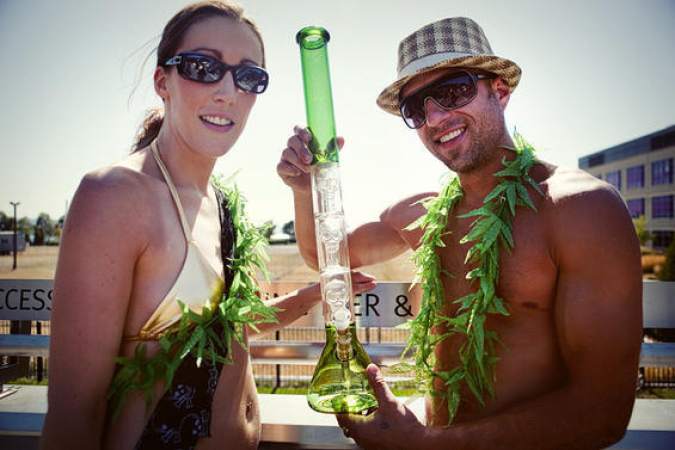Last year Seattle Hempfest lacked the friendly vibe it has become known for. Instead of pot-based camaraderie and good, high times, a fierce and contentious debate raged.
Initiative 502, which would legalize the possession of up to an ounce of pot in our state for adults, was on the ballot but not yet law. Though legalizing marijuana had long been a goal of the Hempfest crowd, many in the marijuana community were fearful of I-502, leery of the DUI provision it contained and the power it gave the state in creating Washington’s pot marketplace.
This year, according to Hempfest Executive Director Vivian McPeak, things will be different at the festival. Though there are still plenty of people skeptical of I-502 and the legalized pot landscape it has created in Washington, McPeak says one of the goals of Hempfest 2013 is to “let some healing happen.”
“I think the community is going to come together. … In general, I think the community has more in common than in disagreement,” says McPeak of what he expects from this year’s Seattle Hempfest, which is scheduled for Aug. 16 – 18 at Myrtle Edwards and Centennial Parks (and still awaiting its permit from the city). “This is the Petri dish we’re living in. I think the smart people look for a way to move forward.”
Based on the contentious nature of the I-502 debate, that might not be easy. But with six months of legalized marijuana under Washington’s belt – if not clarification from the feds, or finalized rules from the state agency tasked with overseeing the production and sale of pot – some things are becoming clear.
In the lead-up to November’s passage of I-502 one of the greatest fears surrounding the initiative was the DUI provision it contained, allowing for DUI charges for anyone found driving with over five nanograms of active THC per liter of blood in their body. Many medical marijuana advocates argued that such a provision would essentially bar medical marijuana patients from ever getting behind the wheel.
“As a medical marijuana patient, I will never be under five nanograms,” medical marijuana activist Steve Sarich declared during an I-502 debate on the University of Washington campus last October. Sarich led the “No On I-502” campaign.
“I’ve had my blood tested and I’m probably four to five times the legal impairment limit right now. That will be every medical marijuana patient,” Sarich said, proclaiming that this unrealistic measure of impairment would wrongfully put thousands in jail and launch a new age of prohibition. “I am for legalization. … Unfortunately this is not legalization. Don’t be fooled,” he warned of the initiative.
However, six months into our legal weed experiment in Washington those fears have yet to materialize. The King County Prosecutor’s Office says only 14 DUI cases have been filed under the five nanograms provision, while the Seattle City Attorney’s Office says it has filed exactly one case (though spokesperson Kimberly Mills says there are “several under review for possible filing”). The Pierce County Prosecutor’s Office, meanwhile, reports a total of 19 marijuana-related DUI charges so far in 2013.
Stats aside, McPeak says it would be premature for either side of the I-502 debate to declare victory.
“It’s too early for either camp to start waiving a banner of ‘we were right,’” says McPeak of the debate surrounding I-502’s DUI provision and the expected tenor of this year’s Hempfest. “I think it would be very helpful if people would just chill. … We disagree, but we’re all in the same camp.”
“No one has ever legalized marijuana before,” he says. “There’s no right way to do it.”








